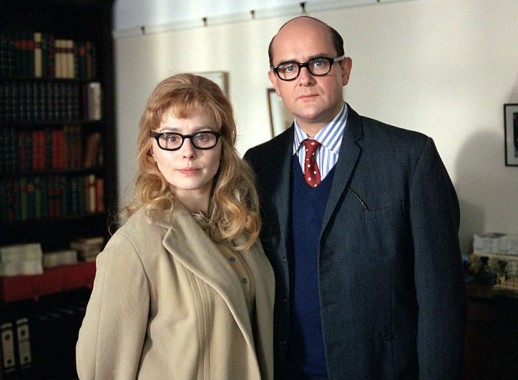Interview by Sarah Donaldson for The Telegraph
A BBC film about the poet Philip Larkin and his relationships with women reveals a surprisingly charming side to the Hermit of Hull. Sarah Donaldson talks to the film’s writer and to the actor playing Larkin.
Throughout the last three decades of his life, Philip Larkin conducted parallel affairs with two women: the flamboyant English lecturer Monica Jones and the gentle Maeve Brennan, who worked with him at Hull University library.
During this period, he also had a shorter affair with Betty Mackereth, his longstanding secretary. This womanising is often held up as evidence of his misogynist tendencies, but a new BBC film focusing on these relationships paints Larkin in a softer light. Written by Richard Cottan and starring Hugh Bonneville, it depicts a cantankerous yet charming man with a genuine capacity for love.
SD: The Philip Larkin you present in Larkin – Love Again is a warm, engaging, attentive lover to three different women. Why did you decide to focus on his love affairs?
Richard Cottan: Larkin had all his closest relationships with women. His letters to men are full of ridiculous bloke’s bravado, but all of his most intense emotional relationships were with women. There’s a whole side of him that seems to have been forgotten in the years since his death. This was an attempt to reclaim him as a man.
Hugh Bonneville: Yes, there also wasn’t anything about the women in Tom Courtenay’s recent, wonderful play about Larkin [Pretending to be Me]. It’s not that they were airbrushed out, just that his life was incredibly rich but compartmentalised.
It’s a classic librarian thing, I suppose. He could segregate areas of his life. Kingsley Amis said that Larkin referred to Maeve Brennan once in a letter, and Amis thought, “Who the hell is Maeve?” He’d never heard of her – and Larkin never mentioned her again.
After Larkin’s death in 1985, two key publications – Anthony Thwaite’s Selected Letters and Andrew Motion’s biography – transformed his public image. On the evidence of his private correspondence, the grumpy, self-deprecating teddy bear became a racist, two-timing misanthrope.
Tom Paulin said the letters revealed “the sewer under the national monument Larkin became”. But your Larkin is often romantic, a bit of a softy, a charismatic charmer, even.
RC: Motion’s version of Larkin wasn’t the whole picture. With a film you can capture something you can never capture in a biography – the essence of somebody’s humanity.
HB: I think there was a sort of prurient knee-jerk reaction to those two books: Larkin was a lothario and shagging everyone in sight; Larkin’s father had a statue of Hitler, therefore he was a Nazi. Now that all the fuss has died down, we can re-evaluate him. I was expecting this sort of dour, macintosh-wearing curmudgeon, but his letters and diaries reveal such witty humanity.
RC: There was a lot of stuff about his “harem”, which is absolute nonsense. The relationships were something that he just muddled into in his rather inept way. Maeve was intellectually unthreatening and very cosy and Monica was the opposite – intellectual, feisty, difficult.
That was the problem. He could never make up his mind which of those two lives he wanted. Monica and Maeve both knew about each other, eventually, and they carried on having a relationship with him. I don’t think it was a devious thing at all.
HB: He wasn’t a calculating lothario. He had every good intention of being as honourable as he could but just painted himself into these corners. In his own way, he genuinely loved all the people who were important to him. Maeve Brennan talks about his courtliness and gentlemanliness, his courtesy to the women in the staff, wanting to know about their marriages and babies.
RC: That’s why in the film we have him giving the women poems. He was saying, I can’t offer you anything else, but I can give you my work, which you helped with.
How did you research the film?
RC: I read pretty much everything that exists about Larkin and I went up to Hull to meet Jean Hartley, his first publisher at the Marvell Press. I met Maeve, but only after I’d written the script. [Brennan died last month, some time after the completion of Love Again].
HB: We both chose not to go and meet Maeve until afterwards because we thought that we might end up siding with her rather than Monica or Betty. Jean Hartley was a good independent referee. She kept emphasising how funny and entertaining Larkin was, and how good he was with her children.
You don’t get that from these writers who just trot out what they’ve read about him. Maeve was astonishing. I can absolutely see why Larkin adored her – she had such complete open-hearted naturalness and a real love of life.
Tara Fitzgerald delivers an extraordinary performance in Love Again as Monica, a woman torn between her desire to be modern and independent and her attachment to her soul mate. Where did you get the material for such a rich characterisation?
RC: There are a lot of disguised versions of Monica in novels. Larkin based Augusta Bax in his unfinished novel A New World Symphony on her, and the Margaret Beal character in Kingsley Amis’s Lucky Jim is a vicious caricature of her.
She also features in Malcolm Bradbury’s Eating People is Wrong, a campus novel set in Leicester, where Monica was a senior lecturer. She was quite a figure – feisty, eccentric and sexy. She had a tartan mini-dress for giving lectures on Macbeth. A lot of that sense of Monica not wanting to be weak, fighting against being stereotypically “womanly”, came from that novel.
There are some fascinating scenes in the film of Monica and Larkin filming themselves out on country walks, or taping themselves reading. Are they based on real events?
RC: Larkin had a real love of gadgets. He loved recording things. I was able to hear a tape of him interviewing his own mother, which not even Motion had had access to. It gave me some wonderful material for the film where she talks about how she met Larkin’s father.
HB: There’s a scene at the beginning of Love Again where Larkin and Monica tape themselves reading The Importance of Being Earnest. It’s based on a real recording in the library in Hull. I went to listen to it, expecting it to be them doing half a scene and then falling about laughing, but it’s the entire play. They do it very seriously.
RC: The home-made film stuff isn’t based on real footage – I’m not sure that Larkin ever had that sort of camera – but he was a keen photographer.
HB: Yes, he took loads of self-portraits. It’s a strange contradiction – he was incredibly self-conscious physically, and yet very vain – he was always immaculately dressed. Jean Hartley said he took so many pictures of himself because he was always hoping that the next picture would make him look good. He was a wonderful complicated mix of the vain and the awkward, the impish and the reserved.
There’s a scene in the film in which Monica and Larkin recite a racist poem. Why did you decide to include that?
RC: Larkin had very Right-wing views, which I didn’t want to completely ignore. He and Monica used to record these bigoted ditties on the tape recorder and they really got off on it. But I wanted to show that it was a kind of natural thing as opposed to him sitting around brooding. He had no political agenda, he was an unthinking saloon-bar crony.
Now that you know Larkin so well, what do you admire most about him?
HB: Reading all his notebooks, I discovered just what a diligent perfectionist he was. He was meticulous in his search for words and I really respect that obsession with being the best at your craft. He was a complex, ordinary, but vastly talented man.
RC: I love the way his poems are universal and yet intensely personal. So many of them are just about the man in his bedroom who’s bald with glasses, who’s afraid of death, who can’t sort out his sex life. But despite his intense self-absorption, he is incredibly funny. He’s in that great tradition of English miserablism, alongside Tony Hancock or Eeyore, with that wonderful understated gloom.
HB: I would have loved to have met him, particularly around the time of The Less Deceived when he rocketed into the public consciousness. He’d just arrived at Hull, and suddenly there was this famous person working there. All the staff must have been slightly bowled over. I wonder if he was the literary equivalent of the Spice Girls?









